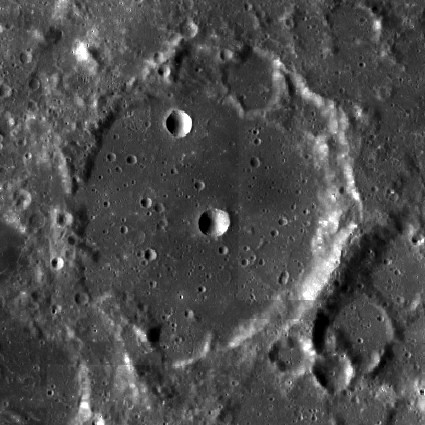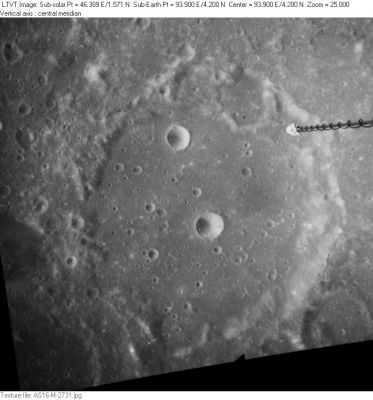Babcock
Contents
Babcock (with Zasyadko on its floor)
| Lat: 4.2°N, Long: 93.9°E, Diam: 99 km, Depth: 2.3 km, Rükl: (farside) |

left: AS16-M-2731 . right: LROC
The largest one of the two bowl-shaped craters on Babcock's floor is Zasyadko.
Images
LPOD Photo Gallery Lunar Orbiter Images Apollo Images
AS11-44-6632 and the following photographs in Apollo 11's Magazine 44-V show the approaching Ascent Stage of LM Eagle over Fox and Fox A, and Babcock with the small crater Zasyadko (on Babcock's floor) above-right of Eagle. Note the rising Earth at the curved horizon! Looking west. Compare this photograph with page 128 (LAC 64) in the Clementine atlas.
Research: Danny Caes
Maps
Description
Description: Wikipedia
Additional Information
Depth data from Kurt Fisher database
- Pike, 1976: 2.3 km
Nomenclature
- Named for Harold Delos Babcock (January 24, 1882 – April 8, 1968), an American astronomer, and the father of Horace W. Babcock. He worked at the Mount Wilson Observatory from 1907 until 1948. He specialized in solar spectroscopy and mapped the distribution of magnetic fields over the Sun's surface. With his son he revealed the existence of strong magnetic fields in certain stars. The Astronomical Society of the Pacific (ASP) awarded its Bruce Medal to Harold Babcock in 1953.
- Although Babcock appears in the cumulative list of approved names in IAU Transactions XVB, it is not clear precisely when and where this libration zone feature name was approved. - Jim Mosher
LPOD Articles
Bibliography
H. D. and H. W. Babcock in the Sourcebook Project (William R. Corliss)
- Page 602 in Mysterious Universe, a handbook of astronomical anomalies (1979) :
- Existence of Net Electrical Charges on Stars (V.A.Bailey, Nature, 1960).
